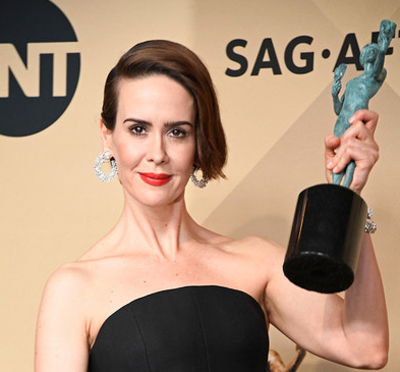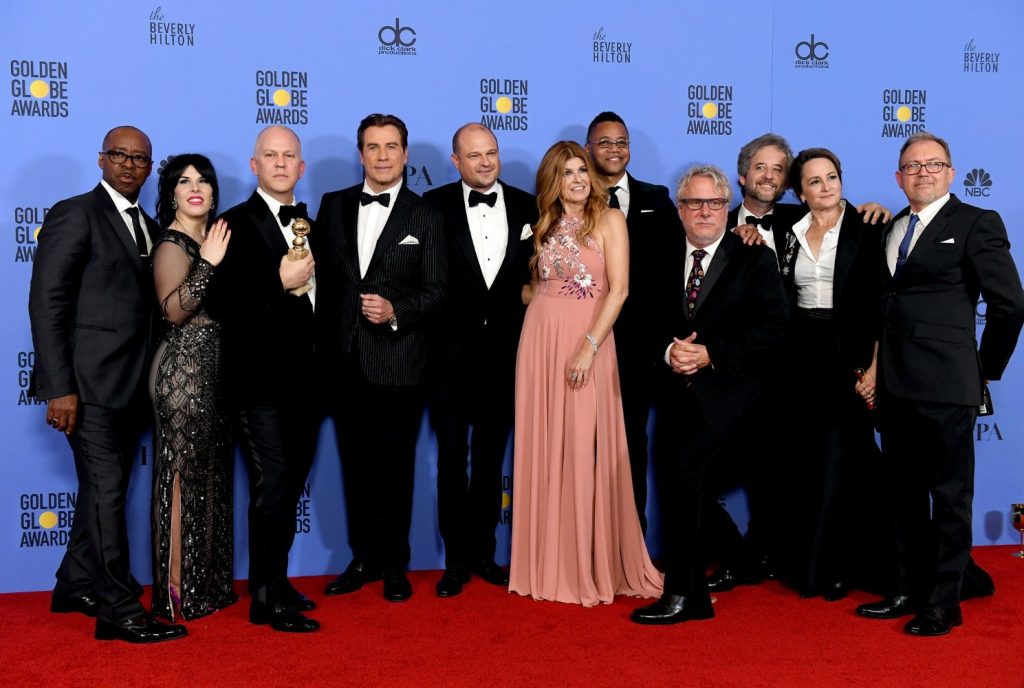January 30, 2017
by Carla Hay
The 23rd Annual Screen Actors Guild (SAG) Awards took place on January 29, 2017, at the Shrine Auditorium in Los Angeles.
SARAH PAULSON
SAG Award win:
Outstanding Performance by a Female Actor in a Miniseries or Television Movie
(“The People v. O.J. Simpson: American Crime Story”)
Here is what this SAG Award winner said backstage in the SAG Awards press room.

BACKSTAGE INTERVIEW
Could you expand a bit on why you decided to comment on what you commented about tonight? Was it a tough decision or an easy decision?
No, it wasn’t a tough decision to come up with what I wanted to say. I am not an immigrant. I was born here, so in terms of how I can speak about it from a personal standpoint from my youth or something wasn’t available to me, so I just wanted to have an opportunity to mention the inclusivity that I think is required right now in general. The ACLU, to me, represents that sort of across the board, and they do really rely on funds from people like you and me. So at this time, it’s an odd thing because this has been a very celebratory time in my life, in terms of my work being recognized at the same time it’s sort of dovetailing with a very interesting time in our country.
And so even as I was getting ready tonight as excited as honored as I was, I felt the duality of the celebration and also the seriousness of people who are at JFK right now people, who are at LAX, people who are at airports all over the country. It just feels like a grave time. At the same time I also feel very honored and proud so I’m trying to find a place to put it where I can be celebratory and also give the day its appropriate weight.
In this time of women’s marches and whatnot, what did you take away from Marcia Clark?
Everything I possibly could. To me, she was and is an incredibly, smart, complicated—not without flaws—human woman and I find that very relatable. I too am full of flaws and complications, and sometimes I think more and more this is less true. Certainly on television, you are seeing such diverse complicated characters now more than you used to, but still what we’ve got going on outside of the entertainment industry sort of strikes a little bit of fear. I feel very honored to have played her, and I don’t know when I’ll come across a role like that again.
As an actor in this political climate, do you feel pressured to kind of make these statements?
I think we should all now be able to speak our minds as we see fit. I do think silence is not golden at this particular time. I do think if you have a platform in a place to say it with a large audience and you can reach further than you, then you should take the opportunity. But I don’t want anyone to feel that they’re failing if they’re not doing it or if they forget to or they get overwhelmed.
It’s what happens to you when you get up there. I could never have said this to you a year ago because I haven’t had the experience, but I have been getting up there more than I ever have. It is hard to keep your bearings, and when you feel the extra desire to communicate a larger world view, you do feel that that weight. But I think people should do whatever they’re moved to do in general.
What have all these accolades done for you as an actress?
Well, that’s hard too. That’s a blessing and a curse because now I fear the next time I come out of the gate with something people will be going, “Well that wasn’t as good as Marcia Clark.” But that’s just a normal human reaction to having some success.
I’m 42 years old, and I’ve been working for a long time, and I’ve certainly been employed and made my living as an actress for many, many years, but this is a whole new world that I’m living in, absolutely. And with that does come a whole new set of neuroses—at least for me particularly, where I do think, “Oh God, I hope I don’t disappoint next time I put something out there.”

